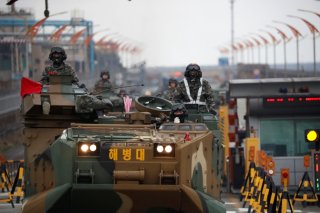Should South Korea Adopt An All-Volunteer Force?
A cratering population and rapidly depleting conscription pool have persuaded many in the defense ministry and academia that an all-volunteer force is not only inevitable but also desirable.
Even as the total number of uniformed personnel declines, the existing force operation costs should radically increase for better treatment and training. To catch up with advancing defense systems and the professionalization and specificity of requisite forces, more outlays should be allocated to force improvement. Israel spends more than 5 percent of its GDP on defense. Despite similar, perhaps even more overwhelming, security challenges, South Korea spends less than 3 percent.
This is important for another reason. No matter what happens to the draft, South Korea should still train everyone, be it through mandatory essential military training or civilian engagement. Reserve forces and wartime mobilization can add to deterrence. The number of South Korea’s reserve forces is over 3 million. These reservists can all shoot rifles, throw grenades, and understand military discipline. During the 1992 Los Angeles riots, some 300 Korean immigrants formed a watch team, made up of a situation room, task forces, and infantry platoons, to protect their stores from looters. They were all reserve forces.
In case of a war on the Korean Peninsula, reservists can accomplish so much, depending on their former specialty. As long as munitions keep flowing from abroad and wartime production continues, the reserve force is formidable. Annual reserve force training is critical and the government should lengthen training periods and train with the latest weapons.
Women should also be allowed to serve too. South Korea’s Supreme Court has cited biological differences between men and women as a reason to uphold male-only conscription. Meanwhile, the defense ministry balks at drafting women for fear of straining the existing military structure by accommodating women. Seeing the tragedy unfolding in Ukraine, however, more than 40 percent of South Korean women in their twenties support a female draft. Considering that the vast majority of South Korean women are uncomfortable performing the same type of military service as men, they could lend support to civilian sectors necessary for wartime operations and go through basic self-defense training.
Although South Korea is not ready for an AVF or female conscription, every contingency and eventuality should be taken into account and the relevant discussions and preparations should take place. Conscription is terrible, but it does not change the imperative for national defense.
Eunwoo Lee is an independent journalist and a policy analyst based in Paris. Previously, he had served at South Korea’s Ministry of National Defense. His articles have also appeared in The Diplomat, The Japan Times, The Geopolitics, 9DASHLINE, and others.
Image: Reuters.

